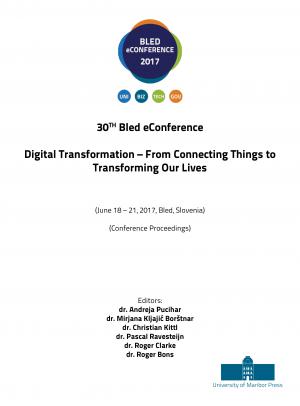Digital Transformation – Form Connecting Things to Transforming Our Lives: (conference proceedings) / 30th Bled eConference, (June 18 - 21, 2017, Bled, Slovenia)
Keywords:
electronic interactions, information technology, government, business, digital technologiesSynopsis
Bled eConference, organized by University of Maribor, Faculty of Organizational Sciences, has been shaping electronic interactions since 1988 and is celebrating its 30th anniversary in 2017. Bled eConference is the oldest, most traditional and well renowned conference in the field. It attracts speakers and delegates from business, government, information technology providers and universities and is the major venue for researchers working in all aspects of “e”. The theme of this year’s conference is dedicated to “Digital Transformation – From Connecting Things to Transforming Our Lives”. The evolution of digital technologies and solutions (e.g. Internet of things, mobile technology, social media, cloud and high performance computing, artificial intelligence and advanced machine learning, virtual and augmented reality, big data & big data analytics, service architecture, digital technology platforms, 3D printing, robotics etc. …) has significantly impacted on the way how business is conducted and had big implications on our lives. The nowadays digital economy calls for transformation of businesses, governments, education and societies as whole. It also calls for enabling policies and politics for cross border and global digital business.
Digital transformation is reflected in the organizations’ ability of comprehensive transformation of business activities, processes, competencies and business models in order to take advantage of digital technologies. Digital technologies require changes in our mind set, culture and functioning and have strategic impact on both the organization itself and its business ecosystems. In this year’s conference, we address various aspects of digital transformation and provide directions and guidelines for organizations to overcome challenges on their way of successful digital transformation. Themes covered in the papers of these proceedings are focused to digital transformation challenges, opportunities and cesses, furthermore to business model innovation, social media and big data analytics implementation, e-health, digital wellness and wellbeing experiences, new applications and organizational models, and novel approaches and cases in education in digital economy.
Downloads






